This summer’s second annual Creativity Conference at SOU attracted leaders of the academic field and working professionals looking for ways to bring creativity into their work, and set a high-water mark in the process.
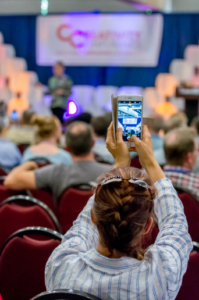 Last month’s four-day conference got kudos from participants for the breadth, depth and structure of its presentations.
Last month’s four-day conference got kudos from participants for the breadth, depth and structure of its presentations.
“The first conference at SOU (in 2018) was a huge success – and 2019 improved on it,” said Mark Runco, executive director of the SOU Creativity Conference and the university’s director of Creativity Research and Programming.
Dan DeNeui, a conference organizer and director of SOU’s Division of Social Sciences, said the annual conference is building a loyal following.
“Many of our attendees (at this year’s event) attended last year’s conference, and a large majority of this year’s attendees indicated that they will likely return again next year,” DeNeui said.
Overall, this year’s Creativity Conference drew more than 240 attendees and presenters from a total of 25countries. It featured more than 180 talks, panels and posters on topics such as learning through creative play, creativity and well-being, creative problem-solving and the importance of creative spaces.
“Great range of presentations, styles and approaches to applying creativity in various areas of work, government and education,” one participant wrote in an evaluation of the conference.
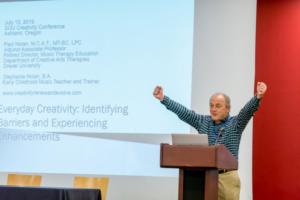 This year’s keynote speakers were Teresa Amabile, a Baker Foundation professor at Harvard Business School; Dean Simonton, a professor emeritus of psychology at the University of California, Davis; and Torrie Allen, who will become the president and CEO of Arts Midwest this month.
This year’s keynote speakers were Teresa Amabile, a Baker Foundation professor at Harvard Business School; Dean Simonton, a professor emeritus of psychology at the University of California, Davis; and Torrie Allen, who will become the president and CEO of Arts Midwest this month.
Amabile’s work focuses on individual creativity and productivity, and organizational creativity and innovation. Her keynote address was presented by LEGO – which served as a corporate sponsor of this year’s conference, along with Scienceworks, OSF, SOU’s Schneider Museum of Art and six other companies or organizations.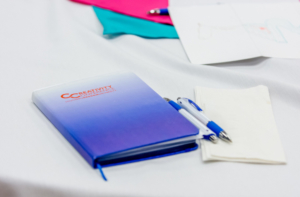
Simonton’s studies focus on human intelligence, creativity, greatness and the psychology that drivesscience. Allen, who takes over the lead position at Arts Midwest this month, was previously the Oregon Shakespeare Festival’s director of development and has been a national arts leader for 15 years.
Runco said this year’s panel discussions were also popular, and participants enjoyed the “boom talks” feature. “The presenter has 10 minutes to share their most important idea – boom!” he said.
“One attractive thing about the SOU conferences is that they bring together researchers and practitioners – academics producing cutting-edge research – as well as individuals who have quite successfully applied creativity to business, the arts, counseling and education,” Runco said. “The conferences cover a huge amount of ground, but the format allows the audience to stay energized.”
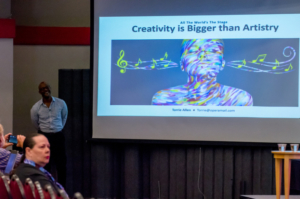 Other featured speakers at this year’s conference included Min Tang, director of the Institute for Creativity and Innovation at Germany’s University of Applied Management; Ron Beghetto, professor and director of the University of Connecticut’s Innovation House; Yael Katz, vice provost for academics at Canada’s Sheridan College; Jonathan Feinstein, professor of creative development at Yale University; Adam Green of Georgetown University, the founder and current president of the Society for the Neuroscience of Creativity; and Roger Firestien, senior faculty member and president of Innovation Resources, Inc., at State University of New York, Buffalo State.
Other featured speakers at this year’s conference included Min Tang, director of the Institute for Creativity and Innovation at Germany’s University of Applied Management; Ron Beghetto, professor and director of the University of Connecticut’s Innovation House; Yael Katz, vice provost for academics at Canada’s Sheridan College; Jonathan Feinstein, professor of creative development at Yale University; Adam Green of Georgetown University, the founder and current president of the Society for the Neuroscience of Creativity; and Roger Firestien, senior faculty member and president of Innovation Resources, Inc., at State University of New York, Buffalo State.
“This was an exciting conference for me,” another conference participant wrote in evaluating the event. “I’m not a creativity researcher, but use the field’s research in my work. I appreciated the mix of research and practical application, the quality of research and other work presented, the energy level of everyone involved and the care taken in planning the event. It was terrific.”
The annual event also provides an opportunity for creativity researchers to collaborate and broaden their network.
SOU has adopted the goal of serving as Oregon’s “university for the future.” Its strategic plan – the university’s roadmap into the future – places an emphasis on creativity, innovation and other human skills that augment technical skills and are particularly valued by employers.
(All images by Michael D. Davis)
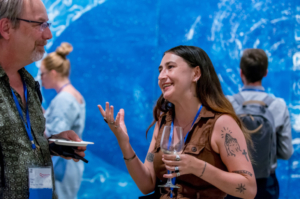
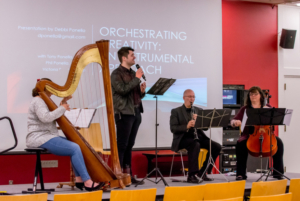







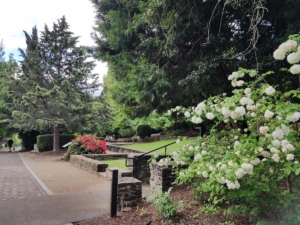 The excavations by
The excavations by 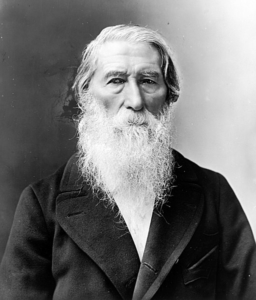

 Last month’s four-day conference got kudos from participants for the breadth, depth and structure of its presentations.
Last month’s four-day conference got kudos from participants for the breadth, depth and structure of its presentations. This year’s keynote speakers were
This year’s keynote speakers were 
 Other featured speakers at this year’s conference included
Other featured speakers at this year’s conference included 



